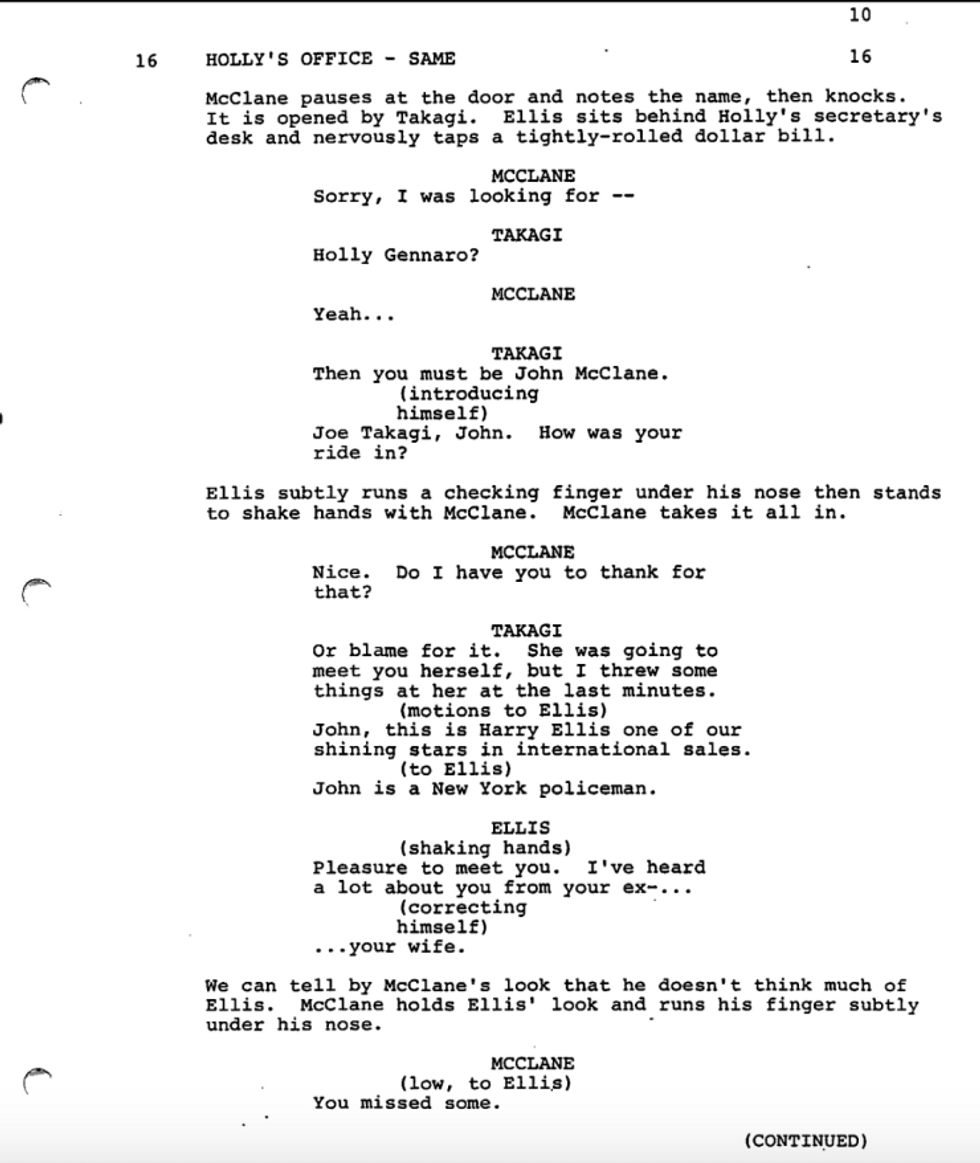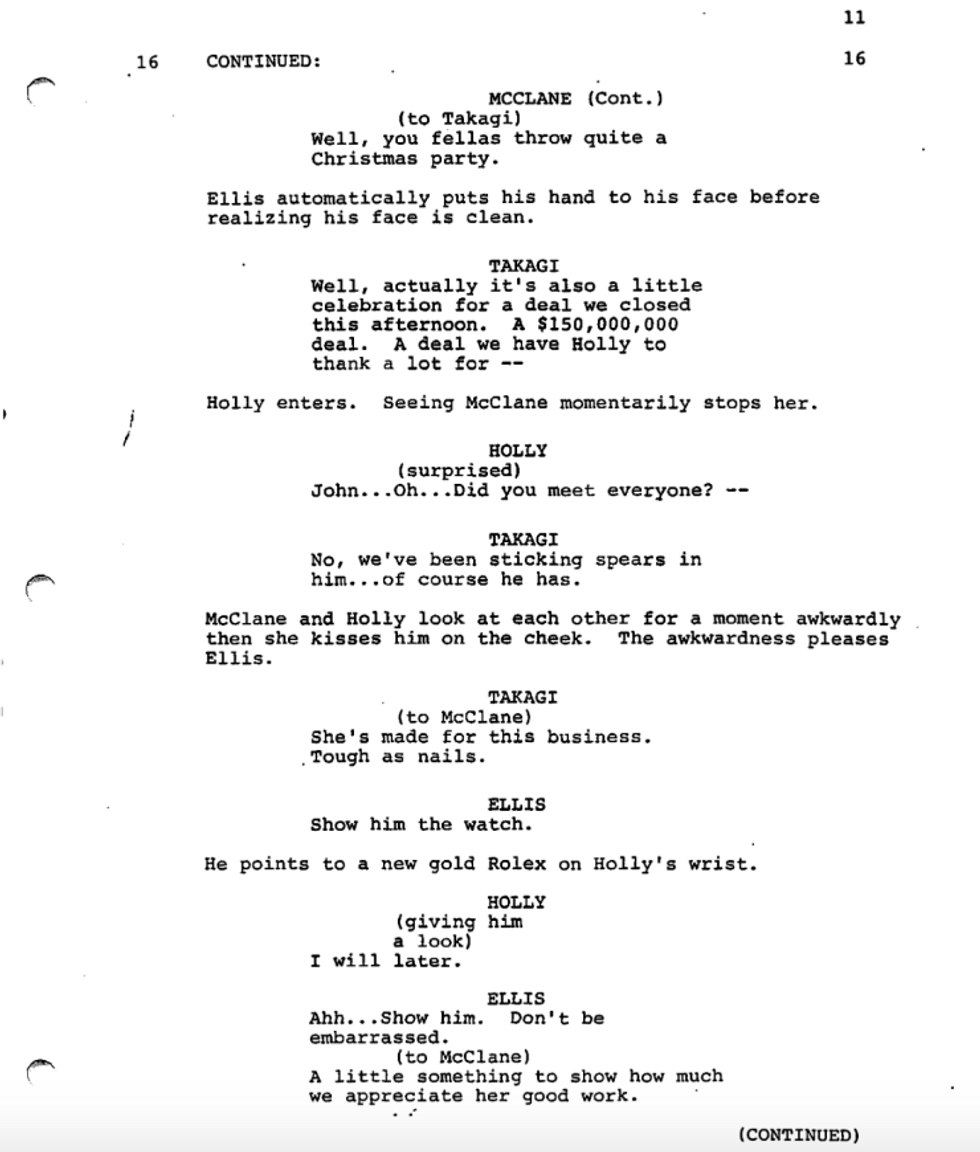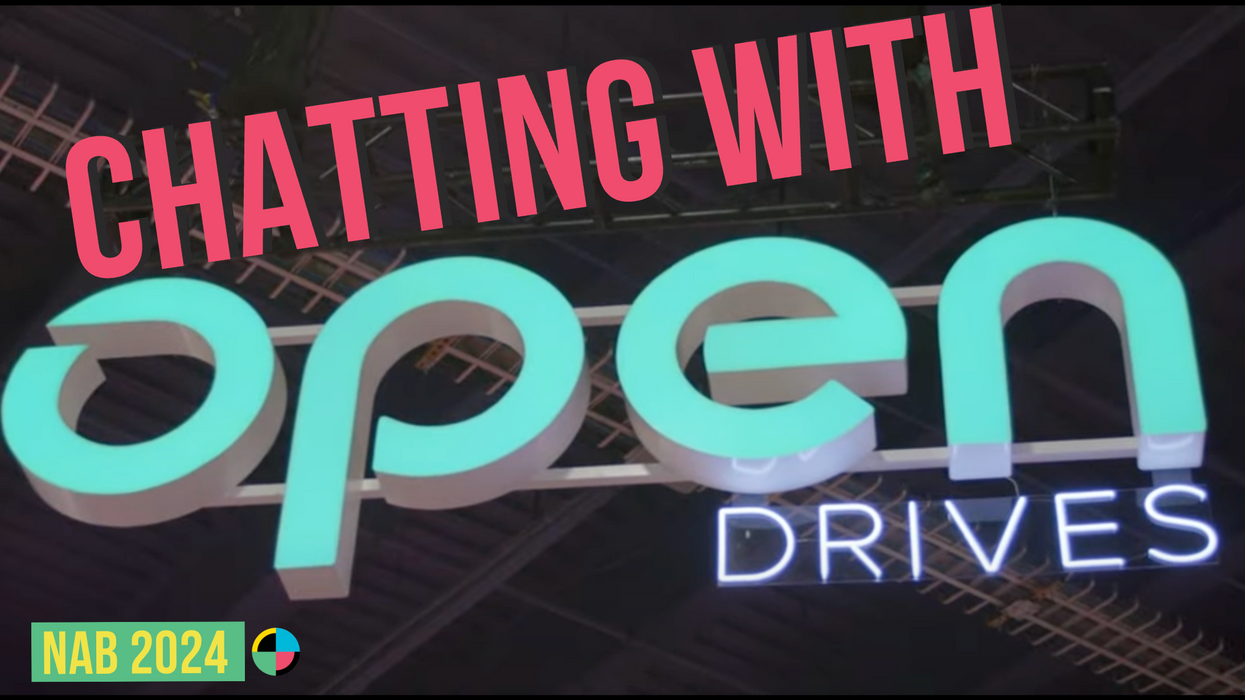Why Today's Blockbusters Feel So Damn Hollow (And How to Write a Better Scene)
Does anyone else get the feeling that big blockbusters today feel… disposable?
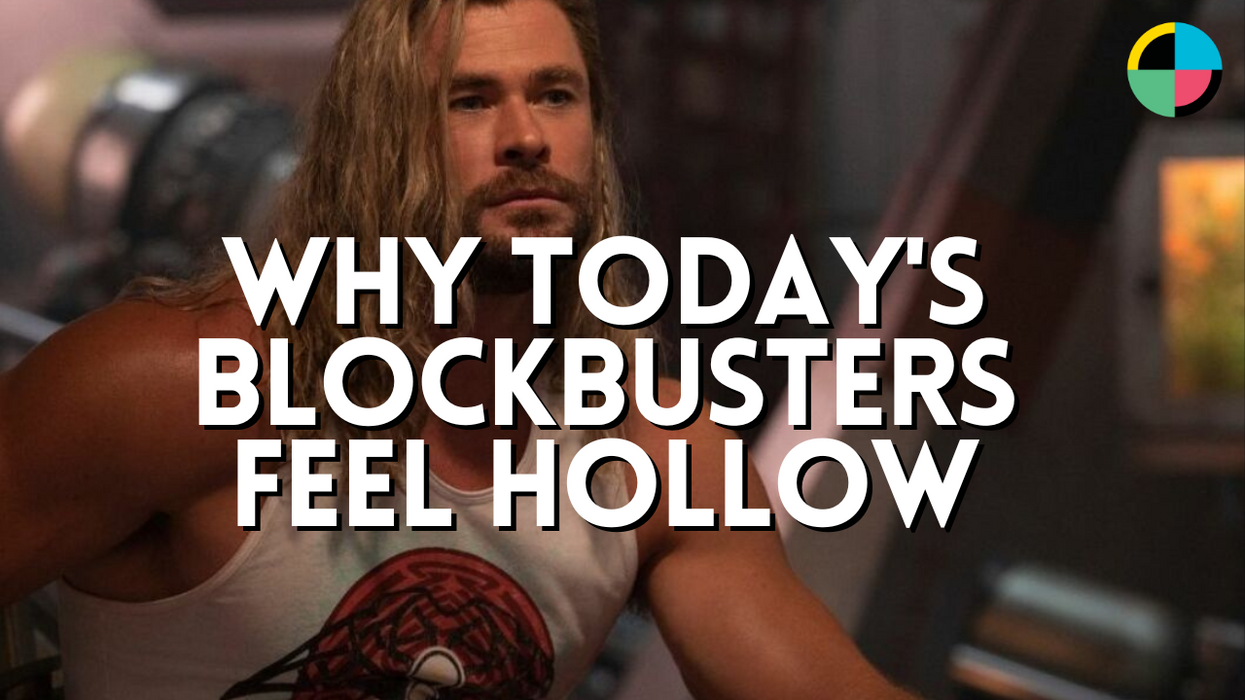
That there’s now something inconsequential about the franchises and characters we know and love? That things that should feel meaningful just don’t? Well, there’s a reason for that...
There are actually multiple reasons, but instead of focusing on CGI versus practical effects or the quarterly fiscal needs of multinational conglomerates, we’re going to look at a much simpler building block, and one that you can actually exert control over—the script.
First, the caveats. Scripts are hard! Particularly when dealing with massive studio IP where there are so many cooks in the kitchen. But even still, there has been a marked and noticeable drop in the emotional impact of so many Marvel, Disney, DC, and Star Wars films lately. And I believe that it doesn’t have to be this way.
To exemplify, I want to look at the dialogue from two recent blockbusters, The Rise of Skywalker and Marvel’s Thor: Love & Thunder, and then compare them to an older film that was also intended to be a big-budget entertainment, albeit on Earth. I'm talking about the original Die Hard.
And to drive home the point, we’re not going to look at any big emotional scenes, but rather expository scenes from early in the films.
These expository scenes are not sexy, but they’re important and are oftentimes some of the hardest scenes to get right. You have to give the audience information about the plot, the characters, and their relationships, all while hiding the fact that it’s even happening.
But today it seems that we’ve entered an age where “banter” has replaced character development and subtext. No shade to banter, either. It’s a great, fun tool that can be used to incredible effect, but I’d argue that it has become a crutch that’s taken the place of filling out meaningful, rich characters that the audience can relate to.
Now, another caveat before the examples. Let’s acknowledge that a pure recitation of finished film dialogue does not accurately convey the feeling in the script or how it reads on the page. But, since we don’t have the scripts available online for The Rise of Skywalker or Thor: Love & Thunder, it’s the best we have. Plus, focusing solely on the dialogue here is hardly a detriment, because both of these scenes don’t have any necessary action or blocking in them. It's all characters either standing and talking or walking and talking. There's no action that's illuminating character.
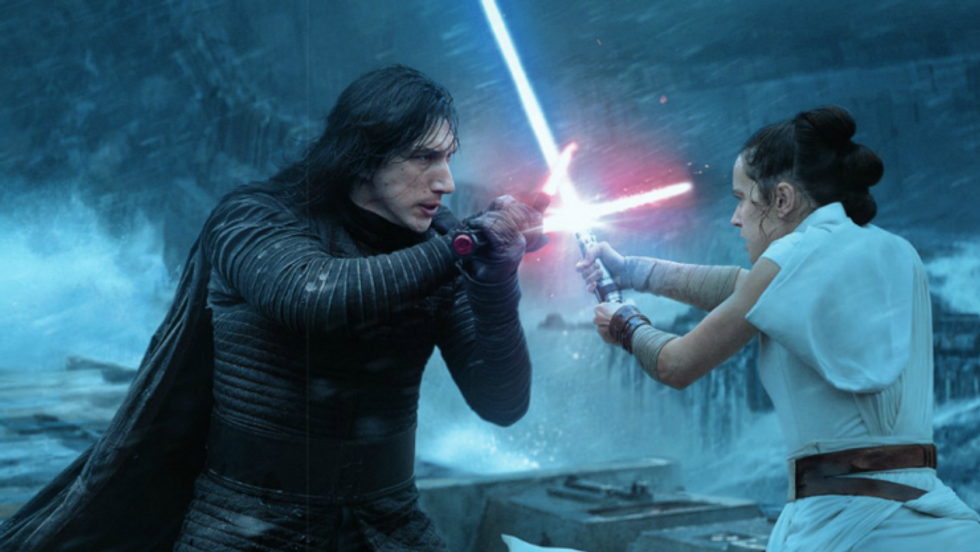
Somehow, the writing is worse
Without further ado, here is a scene from early in The Rise of Skywalker. It’s banter-y! It’s snappy! It’s fast! It’s fun!
And it tells us almost nothing about the characters or their conflicts or what they want.
It really only tells us that they’re all snarky and witty and that Rey and Poe might maybe, possibly have some sexual tension that is never further explored in the film.
In this scene, Poe Dameron (Oscar Isaac) has just arrived back on the moon Ajan Kloss with a damaged Millennium Falcon after gathering information from a mysterious spy in the Empire.
Poe: It’s on fire. Whole thing’s on fire. All of it. It’s on fire. (sees Rey) Hey.
Rey: There’s a spy?
Poe: Really could’ve used your help out there.
Rey: How’d it go?
Poe: Really bad, actually. Really bad.
Rey: Han’s ship!
Poe: What’d you do to the droid?
Rey: What’d you do to the Falcon?
Poe: The Falcon’s in a lot better shape than he is.
Rey: BB-8’s not on fire.
Poe: What’s left of him isn’t on fire.
Rey: Tell me what happened.
Poe: You tell me first.
Rey: You know what you are?
Poe: What?
Rey: You’re difficult. Really difficult. You’re a difficult man.
Poe: You, you are…
Finn: Rey!
Rey: Finn! Oh. You made it back!
Finn: Yeah, barely.
Rey: So, bad mood?
Finn: Me?
Rey: Him.
Finn: Always.
Rey: Do we have a spy?
Chewie: [Chewie sounds]
Rey: You lightspeed skipped?
Poe: Yeah, well, it got us back here didn’t it?
Rey: Poe, the compressor’s down.
Poe: Oh, I know. I was there.
Finn: Every time.
Rey: You can’t lightspeed skip the Falcon!
Poe: Actually, it turns out you can.
Finn: All right, guys, we just landed, okay?
Rey: What happened?
Poe: Bad news, that’s what happened.
Rey: No spy?
Poe: No, spy.
Rey: Did we make contact with a spy or not?
Finn: There’s a mole in the first order and they sent a message.
Poe: (RE: BB-8) You dropped a tree on him?
Rey: (RE: Millennium Falcon) You blew both sub-alternators?
Poe: Well, you know what? Maybe you should’ve been out there with us.
Rey: You know I want to be out there with you.
Poe: Yeah, but you’re not. You’re here training. For what? You’re the best fighter we have. We need you. Out there. Not here.
Finn: It’s true.
Rey: What’s the message?
CUT TO:
[Poe surrounded by other resistance soldiers, waiting for news.]
Poe: We decoded the intel from the First Order spy and it confirms the worst. Somehow Palpatine returned.
Now, other than the bizarre and unintentionally comedic juxtaposition of having a screwball comedy banter sequence before hard cutting to Poe giving seemingly apocalyptic news, let’s look at what is really conveyed here.
The short answer is… not much.
We establish that Rey, Finn, Poe, and Chewie all have a prior relationship. We establish that Poe is a bit of a hot head and is in a bad mood a lot of the time (even though I’d argue that isn’t really seen in many other parts of the film) and we establish that these people all speak very quickly.
But none of it really makes much sense. Logically, if they had all discovered that “somehow Palpatine returned,” wouldn’t it be reasonable for Poe to be in a bad mood? Why wouldn’t Finn feel the same way? The most powerful, vilest mass murderer in the history of the galaxy is somehow alive—and everyone is more focused on some superficial damage to a ship or a droid, both of which we know are going to be fine.
Huh?
When your characters aren’t making logical decisions or acting as real people would act, it becomes nearly impossible for the audience to invest in them. We feel it and we tune out.
So, what is at the heart of the conflict in this scene? Poe and Finn wanted Rey to be out there with them instead of back on Ajan Kloss training. Rey is frustrated because she’s not making fast enough progress and doesn’t feel worthy of Luke’s lightsaber. Okay. That’s… something.
But what could Rey have done to help on the ship? Poe says that she’s the best fighter they have. All right… but, in space? What help would her skill with a lightsaber have been while inside a ship in space?
I’m not trying to nitpick here. On a core level, this conflict doesn’t have weight to it because it doesn’t make sense. If, for example, they had been on a planet and Finn had been injured because Rey wasn’t there to protect him and had instead been messing around with BB-8 and—from Poe’s perspective—doing nothing? Then we'd have some actual conflict.
But as it is, it’s an “argument” in search of a conflict. Why should we care?
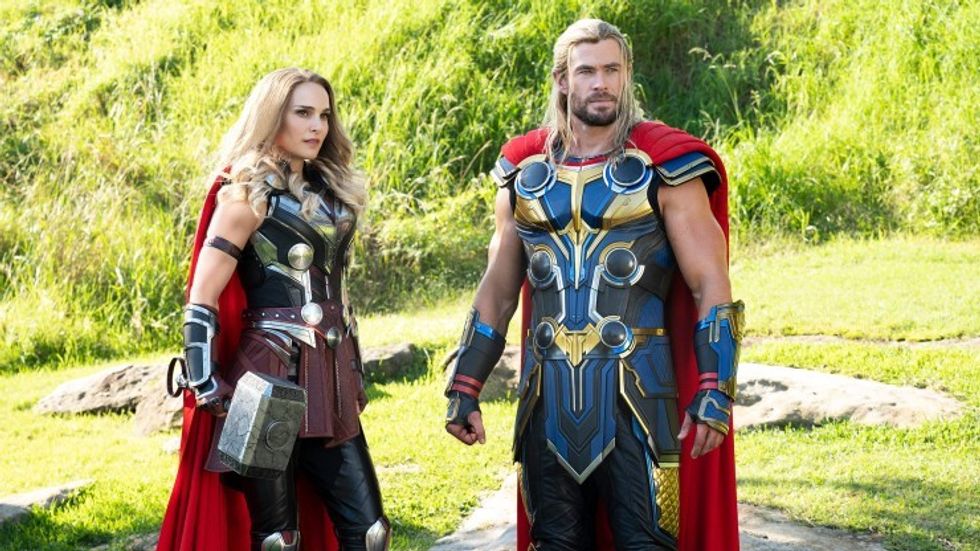
Bore: Love & Thunder?
Here’s a less glaring example of the same issue in Thor: Love & Thunder.
What the writers do well here is add a layer of charm and jokes to a similar scene, making it more enjoyable to watch. We’re having fun while getting our expository vegetables. Except that there’s hardly any necessary exposition here, and we’re still not learning anything about our characters. It’s a wasted opportunity and contributes to the empty feeling of these recent blockbusters.
In this scene, Valkyrie (Tessa Thompson), Thor (Chris Hemsworth), Jane (Natalie Portman), and Korg (Taika Waititi) are standing in a circle and discussing what to do about the big baddie Gorr the God Butcher (Christian Bale), who has abducted the town’s children. Also, for context, Stormbreaker is the name of Thor’s new hammer.
Valkyrie: Are you thinking what I think you’re thinking?
Thor: I’m thinking it.
Jane: What are we thinking?
Korg: Thinking what?
Valkyrie: I’m thinking it too.
Thor & Valkyrie: Omnipotence City.
Korg: Hmm.
Jane: What’s Omnipotence City?
Thor: It’s the home to the most powerful gods in the universe. We could pull together the greatest team ever. We could recruit Ra, Hercules, Tumatauenga, Quetzalcoatl maybe. And Zeus, the oldest and wisest of them all.
Jane: Did you say Zeus?
Thor: Yeah, Zeus.
Jane: Like the Zeus. Zeus-Zeus?
Thor: I’m not sure if he has a second name.
Korg: Do you think my God will be there? Ninny of the Nonny.
Thor: Oh you never know, Korg, but if they are I will ask them to join our team.
Korg: Yes!
Thor: Stormbreaker! All right, calm down! Relax!
Valkyrie: No, no, no, mate. We are not traveling in Stormbreaker’s janky bifrost. Look what just happened.
Thor: We can’t exactly go in your tiny, little flying portal horse, can we? We won’t all fit.
Valkyrie: What are you talking about? Warsong’s awesome.
Thor: Stormbreaker’s awesome too.
Jane: Stormbreaker just needs a conduit. Anything that can handle space travel.
Thor: I love it when she talks shop.
Jane: It has the power to get us there. It just needs something to focus that energy so it’s not so, unpredictable. You know, if we had a ship we could harness it and use Stormbreaker as a power source.
Korg: Like an engine.
Jane: Like an engine.
Valkyrie: You need a ship? I’ve got a ship.
I don’t want to discount how funny much of this sequence is. The actors are great improvisers and their pettiness with each other is delightful, but it’s all the same tone. Everything has little to no subtext, like a stone skipping the surface of a lake.
What is the conflict here? There’s a small one regarding what mode of transportation to take, but go deeper and ask the question—what is the conflict that actually matters to our characters?
There’s no sense of urgency, and they’re arguing about words that have no real-world meaning.
Why should we care if they travel via the Bifrost or via Valkyrie’s ship? What impact does that have on our characters' emotional state? As an audience, we care because the characters care, but it doesn’t appear that any of them particularly care about this one way or another. It’s simply another thing to banter about.
Another thing this scene does better than Star Wars is that each character sounds more specific. They each have their own interests. Jane knows more about science, for example. But still, this scene feels like an approximation of a discussion without anything underpinning it. Even in these sorts of expository sequences, something needs to be at stake for your characters—or why are we watching?
There’s often a lot of talk about “stakes” in screenwriting, which I think tends to be misinterpreted as “life or death.”
Palpatine has returned, so there are stakes. But if we don’t understand how that news affects our characters emotionally, then it isn’t what we mean by stakes. As a random example, the dramatic stakes are much higher in a small domestic scene of a widow finding a letter from their late husband than it is to watch a huge rebel army learn about the return of an evil space wizard, whom no living character has met.
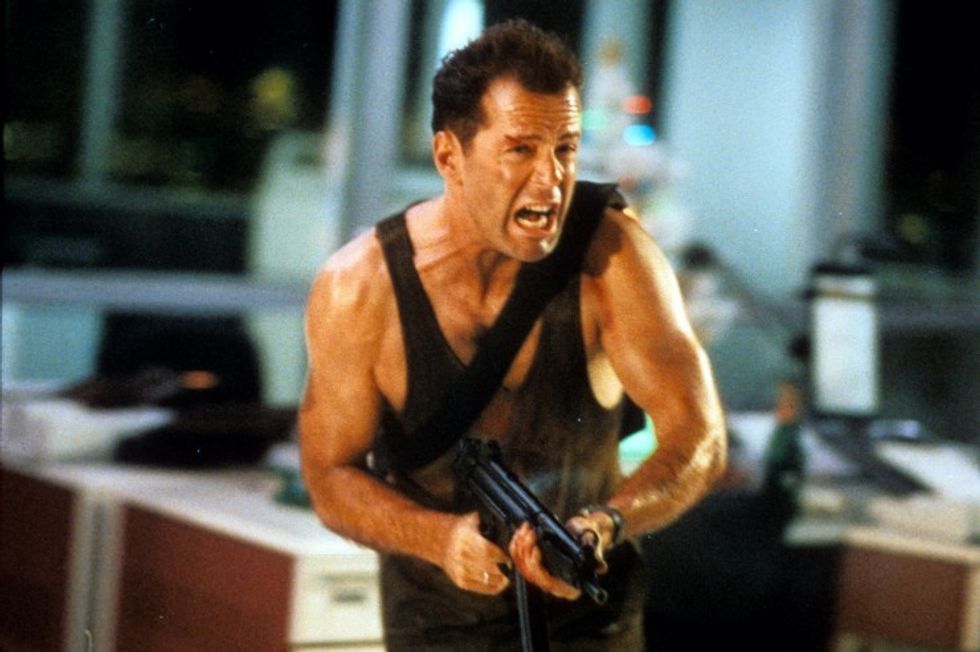
Yipee-ki-yay
Now let’s look at a similar type of scene in Die Hard. It’s mostly shoe leather exposition—who, what, where, why. But there are still a lot of subtle, but important stakes crammed in. Every character has a point of view, and the dynamics are constantly shifting. The relationships are complex and there’s immediately more subtext. It makes it all much richer.
For context in this scene, John McClane (Bruce Willis), a New York police officer has just arrived at his estranged wife Holly’s fancy office in Los Angeles and is looking for her, only to find her boss Takagi and co-worker Ellis instead. Also, instead of being picked up at the airport by Holly, a company limo was waiting for John.
From the start, there’s tension. McClane is here to meet his estranged wife—tension.
He’s meeting her boss and a co-worker, who seems to have a crush on her, both of whom act like they know her more than her husband does—tension.
There’s also an immediate sense of class hierarchy, with McClane on the bottom.
You’ve now earned the right to lay in some exposition, because we’re invested in these dynamics.
And Takagi is blunt in his exposition. He literally explains that Ellis is a hotshot in international sales and McClane is a police officer. It’s not subtle, but it works. And then we’re immediately back to learning about character, all of which pays off later. Ellis makes a jab about McClane’s soon-to-be ex-wife and we instantly know who he is. He’s a douche with a crush on Holly.
Then in McClane’s retort, we discover that he’s smart, sharp, and willing to break the rules. In his one line, we see that he doesn’t like Ellis, knows Ellis just did cocaine, and isn’t going to bust him, but is totally going to fuck with him about it.
What’s most impressive, though, is that every one of these characteristics comes into play later, and we get a taste of them right at the start. Plus, the subtext is something that genuinely matters for the characters. Two men from different socioeconomic classes are competing over one woman.
I don’t know about you, but that’s more interesting to me than whether a “sub-alternator” needs to be replaced.
Takagi then sets up the money that is the reason for the terrorist takeover. Again, the actual exposition isn’t subtle, but because it’s all surrounded by real, relatable emotions, we go along with it and are still invested. Mentioning that Holly has a new watch isn’t interesting, but making it a totem of how successful she’s been in LA without McClain and then later in the film’s climax having it act as the one thing that she needs to let go of to survive... that's interesting.
How to do exposition
So, without continuing to sound like an old curmudgeon, let's sum up by admitting that exposition is a necessary evil and that it’s difficult to do well.
It has also admittedly only become harder as our comic-book and sci-fi worlds grow ever more complicated. Look, I don’t want to have to succinctly explain the multiverse either.
But in an effort to cram in more jargon, we’ve forgotten how important the core desires of our characters are and we’ve made our new blockbusters feel lesser as a result.
No matter how fantastical your writing is, try not to forget that the more complex and nuanced the actual situations are, the clearer your exposition can be, the more the audience will care, and the better your overall writing and storytelling will be going forward.
Let us know your thoughts in the comments.
